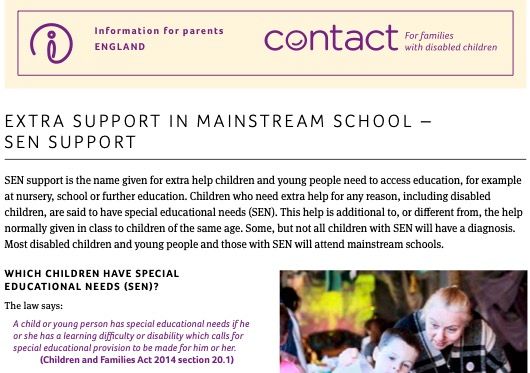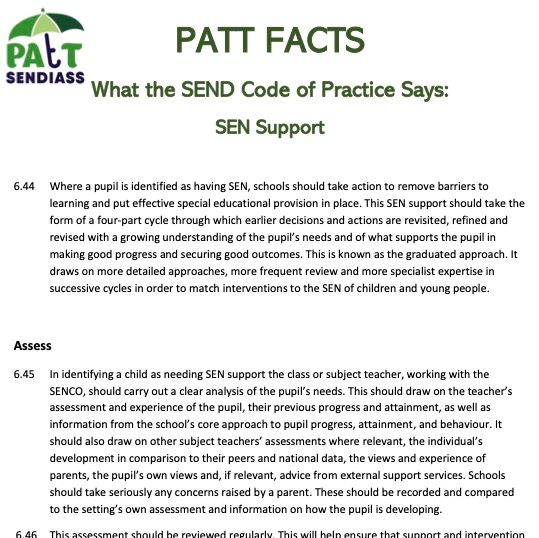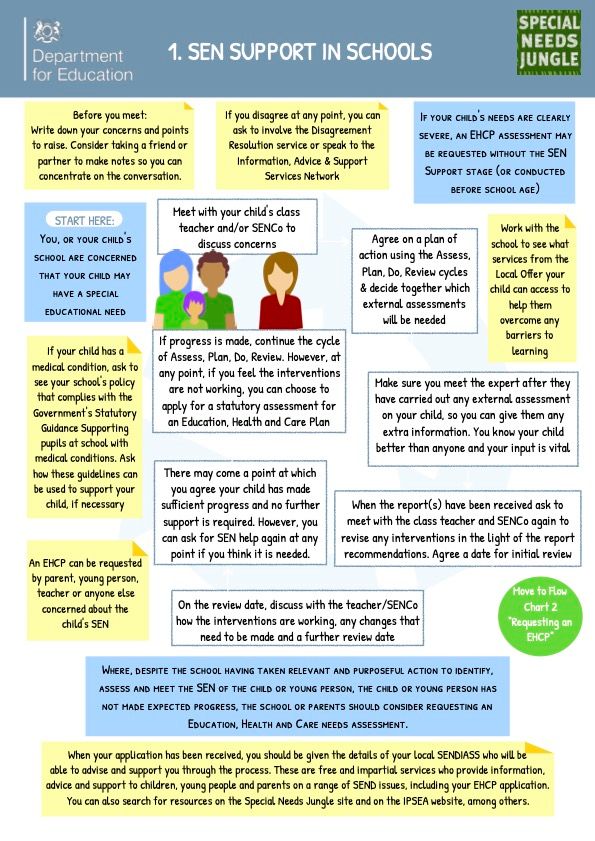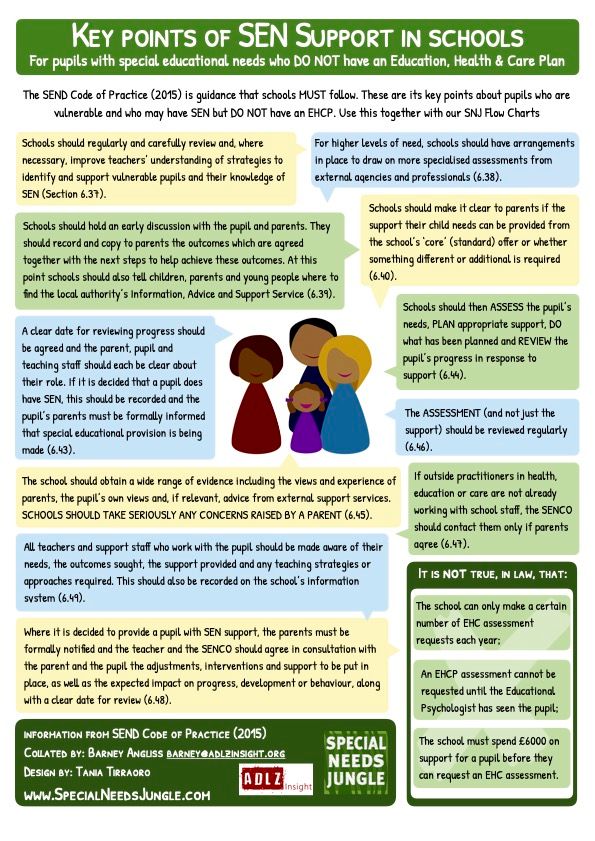Emotional Based School Avoidance
It can be common for children and young people to worry about school from time to time. Experiencing anxiety is part of life and most children will learn ways to deal with this as part of growing up. However, sometimes a child’s worries may lead to difficulties attending school. If a child has high levels of anxiety and does not want to attend school, they may be experiencing Emotional Based School Avoidance (EBSA).

For children with SEND, anxiety or sensory overload can be common factors affecting behaviour and attendance, which are not always immediately identified. If you think there may be underlying needs, discuss and explore with school how these might be identified and supported.
Your child may feel overwhelmed, unable to cope and have tantrums, and physical symptoms or be threatening to harm themselves if you make them go to school. Avoidance is a common stress response. Their anxiety may also visibly reduce during weekends or school holidays.
School refusal due to unmet SEND is not the same as general non-attendance for physical illness or truancy, as the child often wants to be in school, but is struggling to cope with the demands of it.
These underlying reasons can be complex and due to several factors, rather than one single cause. These barriers need to be explored and addressed in order to re-engage the child with their setting and learning.
You can arrange a meeting with all involved professionals and school staff to devise a plan in conjunction with you and your child. The plan should identify any special educational needs and how your child will be supported when they are at school and include what the next steps will be.
The school should keep an optimistic approach and offer support to you in getting your child to school and it is important to keep communicating regularly with the school. You can ask the school for a key member of staff to liaise with so you can report any attendance difficulties immediately. It is also important to remember there is likely to be more difficulty after a school holiday, period of illness or after the weekend, so these transitions should be well supported.
Things you can do:
Ask your child what they find difficult and what they would like to change. This can help identify specific triggers and worries. Your child's views should be the starting point of any discussion about support.
Here are some ideas for support strategies you can discuss with school which may help your child cope:
- meet and greet by a trusted member of staff at the start (sometimes during) or at the end of the day
- adult-led approaches throughout the day to check that they are okay
- help to understand and manage their feelings and emotions
- positive praise (for taking part or getting through a lesson)
- 'time-out' card for when they feel overwhelmed in lessons
- lesson breaks (to allow some calm down time)
- changes to the timetable if particular lessons are a trigger
- learning away from the classroom, in a dedicated area or room sometimes known as a 'safe space'
- lunching away from the dinner hall, ask whether any lunchtime clubs are available
- 1:1 or small group interventions, support programmes, anxiety or friendship groups
- leaving lessons or school 5 minutes early to avoid crowded corridors
- ensure the school have involved the local authority Inclusion Team for advice and guidance on how they can support your child to attend school regularly.
What can schools do?
As part of the graduated approach, found in the SEND Code of Practice, the guidance suggests that schools should:
Assess
Seek to gather information on the EBSA signs and risk factors and to look for potential reasons behind the avoidance behaviour.
The school avoidance may serve functions such as avoiding uncomfortable feelings, avoiding stress, demands or pressures, to reduce separation anxiety from a care giver and/or to pursue reinforcement behaviours out of school.
Plan
Bring together all the information gathered and use it to inform an action or support plan.
Do
Put the agreed strategies and interventions in place.
Review
Use assessment measures to monitor the progress interventions and adjust the plan agreeing the next steps.
What else can I do?
If you think that your child doesn’t want to go to school because of their SEND, you could ask for a meeting with the school to discuss this. We can help you to prepare for a meeting about EBSA.
If you feel that the school are not able to meet your child’s needs you can also consider an EHC needs assessment.
If your child already has an Education, Health and Care Plan (EHCP), it may need to be reviewed. For example, it may be that your child has developed new social, emotional or mental health needs that are not covered by the existing plan. Find out more about how to prepare for a review.
You could also speak to your child's doctor (GP) about your concerns. If the GP agrees that your child is not currently able to attend school, ask them for a letter to give as evidence to the school or local authority for their non-attendance.
If your child is not attending school due to a long-term medical or mental health condition, you can find further information and advice on our medical needs page.
What if my child behaves differently at school?
It is not uncommon for children with SEND to behave differently in different environments.
For example, your child may be presenting as anxious and distressed at home, not feeling able to go to school. Yet, once they are in school they present as a calm and compliant child.
This may mean your child is 'masking' rather than adapting to their environment.
What about reduced and part-time timetables?
All schools, academies and free schools have a statutory duty to provide full-time education for all pupils of compulsory school age.
Education should be:
- Full-time
- Efficient - the education must achieve what it sets out to achieve
- Suitable - to their age, ability and aptitude and any special educational needs they may have. The education must also equip the child for life within the community and must not limit a child’s options in later life.
In exceptional circumstances, schools may decide to propose a reduced timetable to support a pupil's needs.
There must be a clear reason and some evidence as to why this approach is needed.
The Equalities Act 2010 says that it is illegal for schools to discriminate against pupils on the basis of their special educational needs and/or disability, including those with social emotional and mental health difficulties.
What should the Local Authority do?
Government guidance makes clear that where the LA knows that a child is not receiving suitable full-time education, or not receiving the number of hours they could benefit from education, it should step in to arrange provision.
The LA should:
- consider the individual circumstances of each case and be aware that they may need to act whatever the reason for absence, even when a child is on a school roll
- choose, based on all the evidence, whether to enforce attendance or provide the child with suitable alternative education
- keep all cases of part-time education under review with a view to increasing it if a child's capacity to learn increases
- adopt a strategic and planned approach to reintegrating children into mainstream education where they are able to do so; and
- put whatever action is chosen into practice without delay to ensure the child is back in education as soon as possible
In addition to this guidance, the Local Government Ombudsman recently ruled that:
- A council’s requirement that there must be a medical reason for the absence has no sound basis; and
- A council stating they have not had evidence that a child has been unable to attend school, was considered a sweeping statement because parents had clearly documented the difficulties that their young person experienced and what that meant practically for them.
Advice on where to start
SEN Support in Mainstream Schools
This information is about the support that mainstream schools should provide for children with special educational needs (SEN)
The SEND Code of Practice says that:
All children and young people are entitled to an education that enables them to make progress so that they:
- achieve their best
- become confident individuals living fulfilling lives, and
- make a successful transition into adulthood, whether into employment, further or higher education or training
The duties of schools to make SEN provision
The SEND Code of Practice says all schools must:
- use their best endeavours to make sure that a child with SEN gets the support they need – this means doing everything they can to meet children and young people’s SEN
- ensure that children and young people with SEN engage in the activities of the school alongside pupils who do not have SEN
- designate a teacher to be responsible for co-ordinating SEN provision – the SENCO.
- inform parents when they are making special educational provisions for a child
- publish an SEN information report and their arrangements for the admission of disabled children, the steps being taken to prevent disabled children from being treated less favourably than others, the facilities provided to enable access to the school for disabled children and their accessibility plan showing how they plan to improve access progressively over time
What is the graduated approach?
The SEND Code of Practice says:
Where a pupil is identified as having SEN, schools should take action to remove barriers to learning and put effective special educational provision in place. (6.44)
When your child is identified has having SEN, the school should use a graduated approach based on four steps. These are:
Assess
In identifying a child as needing SEN support the class or subject teacher, working with the SENCO, should carry out a clear analysis of the pupil’s needs. This should draw on the teacher’s assessment and experience of the pupil, their previous progress and attainment, as well as information from the school’s core approach to pupil progress, attainment, and behaviour. It should also draw on other subject teachers’ assessments where relevant, the individual’s development in comparison to their peers and national data, the views and experience of parents, the pupil’s own views and, if relevant, advice from external support services. Schools should take seriously any concerns raised by a parent. These should be recorded and compared to the setting’s own assessment and information on how the pupil is developing.
This assessment should be reviewed regularly. This will help ensure that support and intervention are matched to need, barriers to learning are identified and overcome, and that a clear picture of the interventions put in place and their effect is developed. For some types of SEN, the way in which a pupil responds to an intervention can be the most reliable method of developing a more accurate picture of need.
In some cases, outside professionals from health or social services may already be involved with the child. These professionals should liaise with the school to help inform the assessments. Where professionals are not already working with school staff the SENCO should contact them if the parents agree.
Plan
Where it is decided to provide a pupil with SEN support, the parents must be formally notified, although parents should have already been involved in forming the assessment of needs as outlined above. The teacher and the SENCO should agree in consultation with the parent and the pupil the adjustments, interventions and support to be put in place, as well as the expected impact on progress, development or behaviour, along with a clear date for review.
All teachers and support staff who work with the pupil should be made aware of their needs, the outcomes sought, the support provided and any teaching strategies or approaches that are required. This should also be recorded on the school’s information system.
The support and intervention provided should be selected to meet the outcomes identified for the pupil, based on reliable evidence of effectiveness, and should be provided by staff with sufficient skills and knowledge.
Parents should be fully aware of the planned support and interventions and, where appropriate, plans should seek parental involvement to reinforce or contribute to progress at home.
Do
The class or subject teacher should remain responsible for working with the child on a daily basis. Where the interventions involve group or one-to-one teaching away from the main class or subject teacher, they should still retain responsibility for the pupil. They should work closely with any teaching assistants or specialist staff involved, to plan and assess the impact of support and interventions and how they can be linked to classroom teaching. The SENCO should support the class or subject teacher in the further assessment of the child’s particular strengths and weaknesses, in problem-solving and advising on the effective implementation of support.
Review
The effectiveness of the support and interventions and their impact on the pupil’s progress should be reviewed in line with the agreed date.
The impact and quality of the support and interventions should be evaluated, along with the views of the pupil and their parents. This should feed back into the analysis of the pupil’s needs.
The class or subject teacher, working with the SENCO, should revise the support in light of the pupil’s progress and development, deciding on any changes to the support and outcomes in consultation with the parent and pupil.
Parents should have clear information about the impact of the support and interventions provided, enabling them to be involved in planning the next steps.





